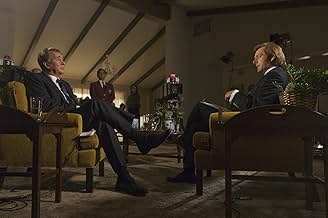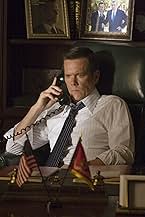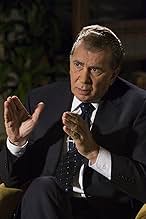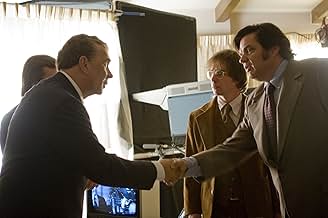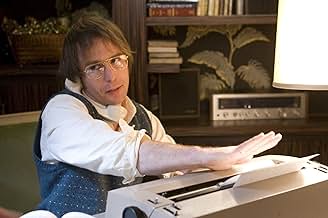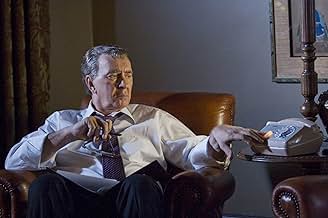अंग्रेज़ी बातचीत के कार्यक्रम के मेज़बान डेविड फ्रॉस्ट और पूर्व राष्ट्रपति रिचर्ड निक्सन के बीच वाटर गेट के बाद के टेलीविज़न साक्षात्कारों का पुनःकथन.अंग्रेज़ी बातचीत के कार्यक्रम के मेज़बान डेविड फ्रॉस्ट और पूर्व राष्ट्रपति रिचर्ड निक्सन के बीच वाटर गेट के बाद के टेलीविज़न साक्षात्कारों का पुनःकथन.अंग्रेज़ी बातचीत के कार्यक्रम के मेज़बान डेविड फ्रॉस्ट और पूर्व राष्ट्रपति रिचर्ड निक्सन के बीच वाटर गेट के बाद के टेलीविज़न साक्षात्कारों का पुनःकथन.
- 5 ऑस्कर के लिए नामांकित
- 23 जीत और कुल 81 नामांकन
फ़ीचर्ड समीक्षाएं
For all many of us who lived through the Nixon presidency and Watergate, this is not the stuff of nostalgia or happy reminiscence. And when the Nixon tapes were published and his bigotry against just about everyone was revealed in explicit "expletive deleted" language, it was time to get disgusted all over again.
Here, portrayed by Frank Langella, we see Nixon as a lonely, vulnerable, angry, and bitter human being, a man who's made a bed he must sleep in for the next twenty years. We also see a manipulative and highly intelligent individual who, despite a great deal of success, had no self-worth. It's the feeling of being an outsider, of never being good enough, that led him to some atrocious decisions.
It's Langella's performance and Michael Sheen's wonderful performance as David Frost -- playboy, comedian, talk show host, and party-giver turned investigative journalist -- that anchor "Frost/Nixon." They are given great support by Kevin Bacon as Nixon's protective assistant, Jack Brennan, Sam Rockwell as James Reston, determined that Nixon pay for Watergate, as well as Oliver Platt, Matthew Mcfadyen, and Toby Jones.
I found the determination of Frost as he attempted to raise financing for the interviews and get networks interested -- with no luck -- very admirable and inspiring. And his gut instinct paid off for him big time.
I transcribed an interview with Nixon that took place in his home in the 1980s, as well as a speech he made during one of the Presidential election periods. He was a brilliant speaker, and as an interviewee, when the interview was over, he engaged the reporter in a very friendly personal conversation.
In the end, both those listening experiences made me sad, as did this film. For everything he achieved, Richard Nixon had undeveloped gifts and potential. He robbed the world of a lot more than the ability to trust government. But in the end, as the film shows, he robbed himself the most.
It's important that the fakery should work well, because the movie must provide lots of closeups that those in the balcony didn't see. So long as it works, the feeling of TV interviews is better achieved in the film, and the actors don't have to yell. The camera, sometimes annoyingly jerky, but in the best moments simply direct and relentless, does their yelling for them.
So I'm saying this is a winner. Peter Morgan after all did the screenplay, and he's no stranger to such efforts--notable examples of his film writing are in The Last King of Scotland and The Queen; a rather less notable one is The Other Boleyn Girl. The flaws are simply in the events. For three of the interview parts, till it gets to Watergate in the fourth, Nixon seems to be winning. Despite a dramatic intervention by Nixon support staffer Col Jack Brennan (Kevin Bacon) to prevent an abject breakdown, Nixon does buckle under in part four. But his admissions still remain in the realm of generality, and there is the question: does anything said on TV really matter? The audience for a West End or Broadway play is a bit different from the popcorn crowd and how appealing this film will be to the mainstream is uncertain. Needless to say it's all talk and minimal action. For students of contemporary American history nonetheless the topic is thrilling. Frost used his own money for down payments. In need of cash and highly mercenary, Nixon used the celebrity agent Swiftie Lazar (Toby Jones) to get $600,000 for the interviews. Frost lost sponsors and the US networks refused to come aboard. He made down payments from his own funds and borrowed. He hired two journalists, Bob Zelnick (Oliver Platt) and James Reston (Sam Rockwell), to do support research. Reston was a firebrand opponent of Nixon. He refused to participate unless there was a commitment to shame Nixon and get him to admit he did wrong in Watergate and betrayed the country's trust.
The issue was whether Frost had the depth to tackle a job like this. He wanted a Watergate confession too, but he let Nicon play him with small talk (despite the man's claim that he was no good at it) and temporize with lengthy self-serving reminiscences that blunted most of Frost's pointed questions. This is where Zelick and especially Reston come in to give a sense of urgency. Again the film excels where the play couldn't in showing Nixon's walk out to his car after each encounter, jubilant at first, pathetic at the end.
Ultimately both in the play and the film, Frost's victory seems a hollow one, of little significance to morality or history. This is above all a story about television. In that arena, this was a coup. and there is great drama in how close Frost's project came to failing. As the encounters got under way, he was losing every sponsor, and later he lost his Australian show, having some time earlier lost his American one. The film tells us they all came back, and then some. Frost never really seems to have reentered the world of American television, but he has had many projects in England and is said now to be "worth £20 million," with a live weekly current affairs program on Al Jazeera English. Nixon is dead, and though he may have won three rounds out of four in the Frost interviews, his legacy is tainted.
The show belongs to Sheen and Langella, but Bacon is excellent as the stiff, loyal Col. Brennan, and Sam Rockwell strong in an unusually serious role for him. As Nixon's somewhat lost wife Pat, the child star of The Bad Seed Patty McCormack is touching. There are lots of other actors, far more than in the stage production, and the best thing is they don't get in the way. San Clemente also plays a significant role. The brightness and beauty of Nixon's ocean-side estate helps dramatize his depression by contrast. There were doubts about putting Howard in charge of the screen version, but they were groundless.
My reluctance had to do with the expectation that it will offer nothing new to somebody who lived through the Watergate years and saw the Frost interviews (although remembering surprisingly little of them).
Ron Howard's film is anything but ho-hum - if anything it's a bit too gussied up to be exciting. There is an element of discernible manipulation of the audience, but mostly it works, and you don't long resist it.
The (relatively) unsung hero of the film besides Howard, Frank Langella's tremendous Nixon, and Michael Sheen's excellent Frost is the screenwriter: once again Peter Morgan (of "The Last King of Scotland" and "The Queen") engages mind and heart, and doesn't let go. Sam Rockwell's James Reston, Jr. and Oliver Platt's Bob Zelnick (Frost's two collaborators) are outstanding, and Kevin Bacon's Nixon-worshipping Jack Brennan is the actor's best work in a long time.
Morgan and Howard manage to make the viewer think constantly of another criminal President without saying or showing anything overt - they just let history, past and present, speak.
I had a strange, uncomfortable thought watching "Frost/Nixon": even if some future film "humanizes" (not excuses) Bush the way Nixon comes through this one, W. would still remain a malevolent midget against Nixon's accomplishments and actual *brain*. How far we have fallen.
Truly... An Historic Encounter of 2 great personaliies... Presented with panache and gripping dramatic flare!
The morning after the Watergate break-in, I brought the newspaper to my university, showing the brief article to everyone who would look. "Tricky Dick is at the bottom of this" I insisted..."NO! He wouldn't be that Stupid!" most of them replied.
In Nixon/Frost we get an insightful look at a gifted, multi-faceted, conflicted personality in all its haunting glory. Nixon was many things. Stupid was not one of them. A Ron Howard Movie about a TV interview? I was very skeptical, to say the least. One single viewing made me a true believer.
Ron Howard has crafted an instant Classic masterpiece. Ripe with couched metaphors and subtle tripwire dialogue, the film's power flows from Ron Howard's ability to present us with the cinematic equivalent of a 100 minute TV close-up of its title characters. Frost/Nixon turns a microscope on both Nixon's strengths and a shopping list of inner demons. Simultaneously vindictive, petty, rancorous, insecure and ever ready to play the victim, more than anything else, Frank Langella's uncanny performance evokes not any hatred, but great pathos.
History is replete with flawed geniuses. But only during the past half century or so... has there been a media obsessed with exposing them for the entire world to see. Michael Sheen is inspired as David Frost, undergoing a great onscreen catharsis. And the re-creation of the interviews is sublime! Cleverly and convincingly Presented as two deftly talented sparring partners, Frost/Nixon is an immensely entertaining/informative slice of history that should satisfy even the most discerning cinematic gourmet.
ENJOY! / DISFRUTELA! 9*********
But what Frost/Nixon - and in particular Langella - does is give humanity to the man. We see his arrogance, his love of power, his need to win (hinted at wonderfully in a moment when he is jogging in his San Clemente home to rousing music), but we also see his inner conflicts, his regrets, the fact that perhaps more than simply his crimes regarding Watergate haunted him - that the impact of his decisions on South East Asia were not entirely remote from him, either. And in a sequence that I will not reveal, to avoid spoiling the plot, we also see a hint of his madness, for it is that, I think, rather than senility. (You have to see it to understand this.)
Ron Howard and playwright/screenwriter Peter Morgan have achieved a remarkable feat in adapting the stage play, which sadly I did not see. Not for a moment does this feel stage bound; instead it is a compelling human portrait of two men - for Frost is fascinating, too, and Michael Sheen captures both his much criticized (at the time) surface gloss and also his deeper fears - but above all of the impact that each of our decisions, large and small, and not least if you are leader of the "Free World," have on us all.
क्या आपको पता है
- ट्रिवियाFrank Langella and Michael Sheen repeated the roles they created on stage. Ron Howard would only agree to direct if the studio would allow both actors to appear in the film version.
- गूफ़Frost and Nixon behave as if they've never met before. In real life, Frost interviewed Nixon when he ran for president in 1968. Nixon enjoyed the interview so much that after he was elected, he met with Frost in the White House to discuss producing a television special.
- भाव
Richard Nixon: That's our tragedy, you and I Mr. Frost. No matter how high we get, they still look down at us.
David Frost: I really don't know what you're talking about.
Richard Nixon: Yes you do. Now come on. No matter how many awards or column inches are written about you, or how high the elected office is, it's still not enough. We still feel like the little man. The loser. They told us we were a hundred times, the smart asses in college, the high ups. The well-born. The people who's respect we really wanted. Really craved. And isn't that why we work so hard now, why we fight for every inch? Scrambling our way up in undignified fashion. If we're honest for a minute, if we reflect privately, just for a moment, if we allow ourselves a glimpse into that shadowy place we call our soul, isn't that why we're here? Now? The two of us. Looking for a way back into the sun. Into the limelight. Back onto the winner's podium. Because we can feel it slipping away. We were headed, both of us, for the dirt. The place the snobs always told us that we'd end up. Face in the dust, humiliated all the more for having tried. So pitifully hard. Well, to *hell with that*! We're not going to let that happen, either of us. We're going to show those bums, we're going to make 'em choke on our continued success. Our continued headlines! Our continued awards! And power! And glory! We are gonna make those mother fuckers *choke*!
- क्रेज़ी क्रेडिटMichael Sheen and Frank Langella are credited simultaneously before the title. Sheen's name is on a lower level, but further to the left; while Langella's is higher up, but pushed to the right. Therefore, depending on whether you read the card top-to-bottom or left-to-right, either actor can be seen as being credited first.
- कनेक्शनFeatured in At the Movies: Summer Special 2008/09 (2008)
- साउंडट्रैकBy George It's David Frost
Written by George Martin (as George Henry Martin)
Performed by Atli Örvarsson
टॉप पसंद
विवरण
- रिलीज़ की तारीख़
- कंट्री ऑफ़ ओरिजिन
- आधिकारिक साइट
- भाषा
- इस रूप में भी जाना जाता है
- Frost/Nixon - La entrevista del escándalo
- फ़िल्माने की जगहें
- Palos Verdes Estates, कैलिफोर्निया, संयुक्त राज्य अमेरिका(Nixon "San Clemente" Compound)
- उत्पादन कंपनियां
- IMDbPro पर और कंपनी क्रेडिट देखें
बॉक्स ऑफ़िस
- बजट
- $2,50,00,000(अनुमानित)
- US और कनाडा में सकल
- $1,86,22,031
- US और कनाडा में पहले सप्ताह में कुल कमाई
- $1,80,708
- 7 दिस॰ 2008
- दुनिया भर में सकल
- $2,74,26,335
- चलने की अवधि2 घंटे 2 मिनट
- रंग
- ध्वनि मिश्रण
- पक्ष अनुपात
- 2.35 : 1
इस पेज में योगदान दें








